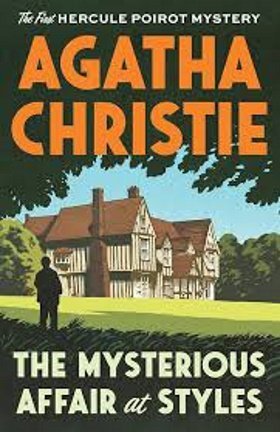The Coroner’s face grew graver.
“Were you in company with anyone?”
“No.”
“Did you meet anyone on your walk?”
“No.”
“That is a pity,” said the Coroner dryly. “I am to take it then that you decline to say where you were at the time that Mr. Mace positively recognized you as entering the shop to purchase strychnine?”
“If you like to take it that way, yes.”
“Be careful, Mr. Inglethorp.”
Poirot was fidgeting nervously.
“Sacré!” he murmured. “Does this imbecile of a man want to be arrested?”
Inglethorp was indeed creating a bad impression. His futile denials would not have convinced a child. The Coroner, however, passed briskly to the next point, and Poirot drew a deep breath of relief.
“You had a discussion with your wife on Tuesday afternoon?”
“Pardon me,” interrupted Alfred Inglethorp, “you have been misinformed. I had no quarrel with my dear wife. The whole story is absolutely untrue. I was absent from the house the entire afternoon.”
“Have you anyone who can testify to that?”
“You have my word,” said Inglethorp haughtily.
The Coroner did not trouble to reply.
“There are two witnesses who will swear to having heard your disagreement with Mrs. Inglethorp.”
“Those witnesses were mistaken.”
I was puzzled. The man spoke with such quiet assurance that I was staggered. I looked at Poirot. There was an expression of exultation on his face which I could not understand. Was he at last convinced of Alfred Inglethorp’s guilt?
“Mr. Inglethorp,” said the Coroner, “you have heard your wife’s dying words repeated here. Can you explain them in any way?”
“Certainly I can.”
“You can?”
“It seems to me very simple. The room was dimly lighted. Dr. Bauerstein is much of my height and build, and, like me, wears a beard. In the dim light, and suffering as she was, my poor wife mistook him for me.”
“Ah!” murmured Poirot to himself. “But it is an idea, that!”
“You think it is true?” I whispered.
“I do not say that. But it is truly an ingenious supposition.”
“You read my wife’s last words as an accusation”—Inglethorp was continuing—“they were, on the contrary, an appeal to me.”
The Coroner reflected a moment, then he said:
“I believe, Mr. Inglethorp, that you yourself poured out the coffee, and took it to your wife that evening?”
“I poured it out, yes. But I did not take it to her. I meant to do so, but I was told that a friend was at the hall door, so I laid down the coffee on the hall table. When I came through the hall again a few minutes later, it was gone.”
This statement might, or might not, be true, but it did not seem to me to improve matters much for Inglethorp. In any case, he had had ample time to introduce the poison.
At that point, Poirot nudged me gently, indicating two men who were sitting together near the door. One was a little, sharp, dark, ferret-faced man, the other was tall and fair.
I questioned Poirot mutely. He put his lips to my ear.
“Do you know who that little man is?”
I shook my head.
“That is Detective Inspector James Japp of Scotland Yard—Jimmy Japp. The other man is from Scotland Yard too. Things are moving quickly, my friend.”
I stared at the two men intently. There was certainly nothing of the policeman about them. I should never have suspected them of being official personages.
I was still staring, when I was startled and recalled by the verdict being given:
“Wilful Murder against some person or persons unknown.”
CHAPTER VII.

























